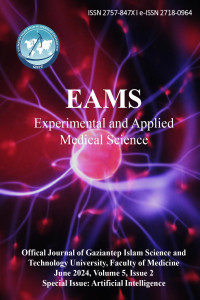Abstract
Considering the advantages such as customizing parameters such as time, intensity, difficulty, speed suitable for the patient level, enriching treatment programs, reducing the possible burnout of the patient and therapist during the rehabilitation process, and increasing motivation, artificial intelligence within the scope of physiotherapy rehabilitation services will increase the quality of rehabilitation services and provide cost-effective results in the long term.
Keywords
References
- 1. Pattanshetty RB, Khan S. A shifting paradigm from human intelligence to artificial intelligence in rehabilitation: A descriptive review. Indian Journal of Physical Therapy and Research. 2022;4(1):8-13.
- 2. Russell S, Norvig P. Artificial intelligence (A modern approach). In 2010 The 2nd International Conference on Computer and Automation Engineering, ICCAE. 2010;Vol. 4.
- 3. Akalin B, Demirbas MB. Rehabilitasyon hizmetlerinde yapay zekâ uygulamaları. 2022;6(2):141-161.
- 4. Bonanno L, Cannuli A, Pignolo L, Marino S, Quartarone A, Calabrò RS, Cerasa A. Neural plasticity changes induced by motor robotic rehabilitation in stroke patients: the contribution of functional neuroimaging. Bioengineering. 2023;10(8):990.
- 5. Liao W, Li J, Zhang X, Li C. Motor imagery brain–computer interface rehabilitation system enhances upper limb performance and improves brain activity in stroke patients: A clinical study. Frontiers in Human Neuroscience. 2023;17:1117670.
- 6. Nayak S, Das RK. Application of artificial intelligence (AI) in prosthetic and orthotic rehabilitation. In Service Robotics. IntechOpen. 2020.
- 7. Sarsak HI. Telerehabilitation services: a successful paradigm for occupational therapy clinical services? International Physical Medicine & Rehabilitation Journal. 2020;5(2).
- 8. Knight E, Stuckey MI, Prapavessis H, Petrella RJ. Public health guidelines for physical activity: Is there an app for that? A review of android and apple app stores. JMIR Mhealth Uhealth. 2015;3(2):43.
- 9. Gazendam A, Zhu M, Chang Y, Phillips S, Bhandari M. Virtual reality rehabilitation following total knee arthroplasty: a systematic review and meta‐analysis of randomized controlled trials. Knee Surgery, Sports Traumatology, Arthroscopy. 2022;30(8):2548-2555.
Abstract
Hasta seviyesine uygun zaman, yoğunluk, zorluk, hız gibi parametrelerin özelleştirilebilmesi, tedavi programlarını zenginleştirmesi ile rehabilitasyon sürecinde hasta ve terapistin olası tükenmişliğini azaltması, motivasyonu arttırması gibi avantajları göz önüne alındığında fizyoterapi rehabilitasyon hizmetleri kapsamında yapay zeka rehabilitasyon hizmetlerinin kalitesini arttırarak uzun vadede maliyet etkin sonuçlar sağlayacaktır.
Keywords
References
- 1. Pattanshetty RB, Khan S. A shifting paradigm from human intelligence to artificial intelligence in rehabilitation: A descriptive review. Indian Journal of Physical Therapy and Research. 2022;4(1):8-13.
- 2. Russell S, Norvig P. Artificial intelligence (A modern approach). In 2010 The 2nd International Conference on Computer and Automation Engineering, ICCAE. 2010;Vol. 4.
- 3. Akalin B, Demirbas MB. Rehabilitasyon hizmetlerinde yapay zekâ uygulamaları. 2022;6(2):141-161.
- 4. Bonanno L, Cannuli A, Pignolo L, Marino S, Quartarone A, Calabrò RS, Cerasa A. Neural plasticity changes induced by motor robotic rehabilitation in stroke patients: the contribution of functional neuroimaging. Bioengineering. 2023;10(8):990.
- 5. Liao W, Li J, Zhang X, Li C. Motor imagery brain–computer interface rehabilitation system enhances upper limb performance and improves brain activity in stroke patients: A clinical study. Frontiers in Human Neuroscience. 2023;17:1117670.
- 6. Nayak S, Das RK. Application of artificial intelligence (AI) in prosthetic and orthotic rehabilitation. In Service Robotics. IntechOpen. 2020.
- 7. Sarsak HI. Telerehabilitation services: a successful paradigm for occupational therapy clinical services? International Physical Medicine & Rehabilitation Journal. 2020;5(2).
- 8. Knight E, Stuckey MI, Prapavessis H, Petrella RJ. Public health guidelines for physical activity: Is there an app for that? A review of android and apple app stores. JMIR Mhealth Uhealth. 2015;3(2):43.
- 9. Gazendam A, Zhu M, Chang Y, Phillips S, Bhandari M. Virtual reality rehabilitation following total knee arthroplasty: a systematic review and meta‐analysis of randomized controlled trials. Knee Surgery, Sports Traumatology, Arthroscopy. 2022;30(8):2548-2555.
Details
| Primary Language | English |
|---|---|
| Subjects | Clinical Sciences (Other) |
| Journal Section | Letter to Editor |
| Authors | |
| Early Pub Date | July 4, 2024 |
| Publication Date | June 14, 2024 |
| Submission Date | March 19, 2024 |
| Acceptance Date | May 31, 2024 |
| Published in Issue | Year 2024 Volume: 5 Issue: 2 |


